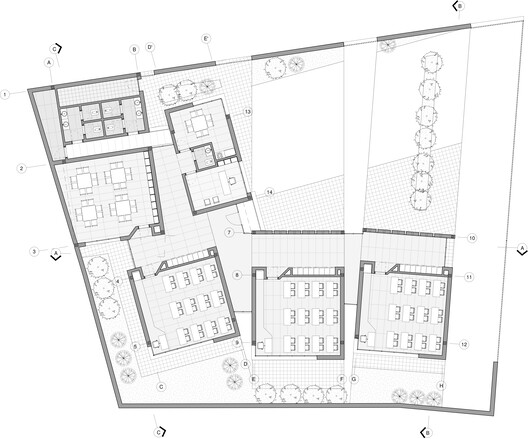
-
Architects: Padiav Parth Architects
- Area: 450 m²
- Year: 2023
-
Photographs:Mohammad Hassan Ettefagh
-
Lead Architects: Bahram Shokouhian, Amir Fazeli

Text description provided by the architects. Ja'farabad is a village with a 250-year history, located in the Khorramdasht district of Takestan County, Qazvin Province. According to the 2016 census by the Iranian Statistics Center, its population was 750. The project for constructing a school in Ja'farabad was brought to us when the village had only two schools for elementary and first-year secondary education. One of these schools, which housed the first three grades, was old and had poor spatial quality. Consequently, with the donation of a plot of land by the city council adjacent to the elementary school, it was decided to design and construct a school for the first cycle of secondary education.

The new secondary school's site is bordered by the village's elementary school to the east, a cemetery to the south, and a residential building to the west. Since the existing plot, measuring 801 square meters was insufficient for the school, the cemetery to the south and the elementary school to the east allocated 2 meters and 8 meters of their land, respectively, increasing the total area to 1112 square meters. During meetings with the client and the intermediary charity organization, we learned that the school space is intended not only for first-year secondary students but also for second-year secondary girls in the afternoons. Additionally, the schoolyard is to be used for group sports such as volleyball. Therefore, this school is not merely designed to provide educational space for first-year secondary students but also aims to create a space for further education and physical activities for both girls and boys, enhancing its educational impact to a socio-cultural one.



The initial concept for the school's form was developed based on the arrangement of educational and multifunctional spaces around a central axis. As the design process continued, the form's geometry evolved in harmony with the trapezoidal angles of the site and its connection with the adjacent fabric. Key considerations in the school's design include adequate natural lighting, proper classroom proportions, strategic classroom placement to minimize noise pollution, easy access to restrooms, and the oversight of administrative spaces over internal and external gathering areas.

The design of the three-classroom secondary school includes three classrooms, a multipurpose space, a principal's office, a teacher's room, student restrooms, teacher restrooms, a kitchenette, a mechanical room, and a storage room. The classrooms are located on the southern side of the site, away from the street and facing south, to benefit from southern light and overlook a dedicated, tranquil green space. The classrooms, which are the main elements of the school, are proportioned to accommodate the number of students, with dimensions of 8.60 meters in width and 7.20 meters in length. Lockers for students are provided on the shared wall between the classrooms and the corridor, outside the classrooms. Each classroom is aligned with one of the site's boundary angles through rotation.


The longitudinal corridor connects all spaces, acting as a buffer between the classrooms and the yard. The corridor wall at the main entrance is open and transparent, while along the classrooms, it is designed with a perforated pattern inspired by traditional "Fakhro-Madin" motifs, allowing light from the northern facade facing the yard. The parapet heights in the corridor area are higher than usual to block the view of air conditioning units and other rooftop mechanical elements.






















